Exam Topics
- F5CAB1
- F5CAB1.03
- Show where to license (activate.F5.com)
- Identify license issues
- Report modules which are licensed for – CLI/config/TMUI
- F5CAB1.05
- Report modules which are licensed
- F5CAB1.03
Introduction
Before you can use or configure an F5 BIG-IP system, you must activate it with a valid license key. Licensing ensures that your system and modules are registered with F5 and grants access to the features you’ve purchased.
The Base Registration Key
The Base Registration Key (BRK) is a 27-character string that tells the F5 license server which products and modules are eligible for licensing on your BIG-IP system.
Example of a Base Registration Key:
AAAAA-BBBBB-CCCCC-DDDDD-EEEEEEE
The Base Registration Key is not a licence key. Rather, it defines which products and modules can be licensed on your BIG-IP system. It comes pre-installed or can be purchased. It also can be upgraded if needed. For example, a Base Registration Key that supports BIG-IP version 15 can later be replaced with one that allows upgrades up to version 17.

However, having only the Base Registration Key is not enough to make the F5 Big IP functionnal. You must activate a valid license to use the BIG-IP system. Without a registered license, the device remains inoperative.
Licence activation using the Dossier
The dossier is a secure, encrypted file containing key characteristics that uniquely identify your BIG-IP platform. It is generated based on the Base Registration Key and sent to the F5 license server for validation.
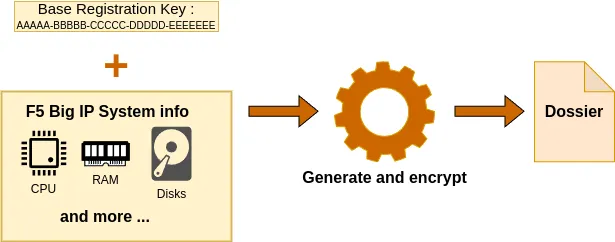
The license server uses the dossier to verify several things:
- That the system is compatible with the module you are attempting to license.
- That the Base Registration Key is valid for the requested modules and only used once.
- Additional internal checks to ensure the request is legitimate.
If all validations pass, the license server generates a valid license file which can then be applied to the BIG-IP, making the system fully operational.
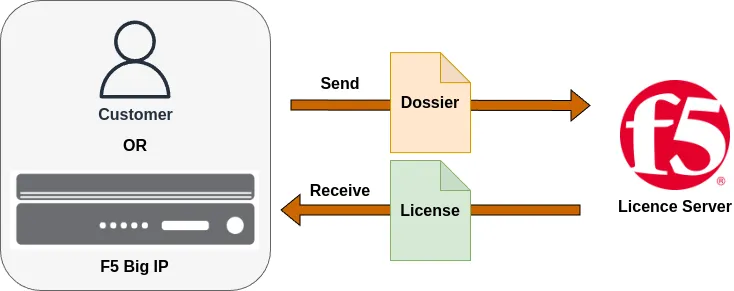
Once the license is activated, the Base Registration Key becomes bound to the specific BIG-IP system and cannot be moved to another device, ensuring the license is tied uniquely to that platform.
Getting a license using the Configuration Utility
There is two way to get a license, using the automatic method or manual.
Automatic
Automatic license activation is a “one-click” process that makes licensing your BIG-IP system quick and convenient. Navigate to the System → License menu :
1. Enter your Base Registration Key.
2. Select Automatic Activation.
3. Click Activate.
The BIG-IP will automatically generate the dossier, send it to the F5 license server, and install the license if the validation succeeds.
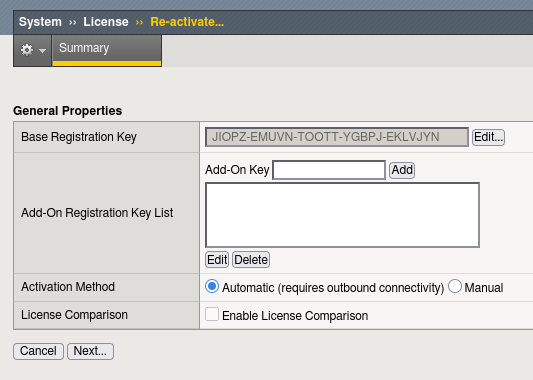
This method is very straightforward and ideal for most deployments. However, it requires a properly configured Management IP with Internet access, since the system must communicate with the license server to complete the activation.
Manual
In some environments, the Management IP may not have Internet connectivity due to network restrictions or security policies. In such cases, F5 provides a manual activation method, which uses an intermediary host with Internet access.
The process works as follows:
- On the BIG-IP system, enter (or confirm, if already preinstalled) the Base Registration Key.
- The system will generate a dossier based on this key. The dossier can be downloaded as a file.
- Using a workstation with Internet access, upload the dossier to the F5 License activation portal (activate.f5.com).
- The portal will return a license file that can be downloaded.
- Upload this license file back to the BIG-IP system to complete activation.
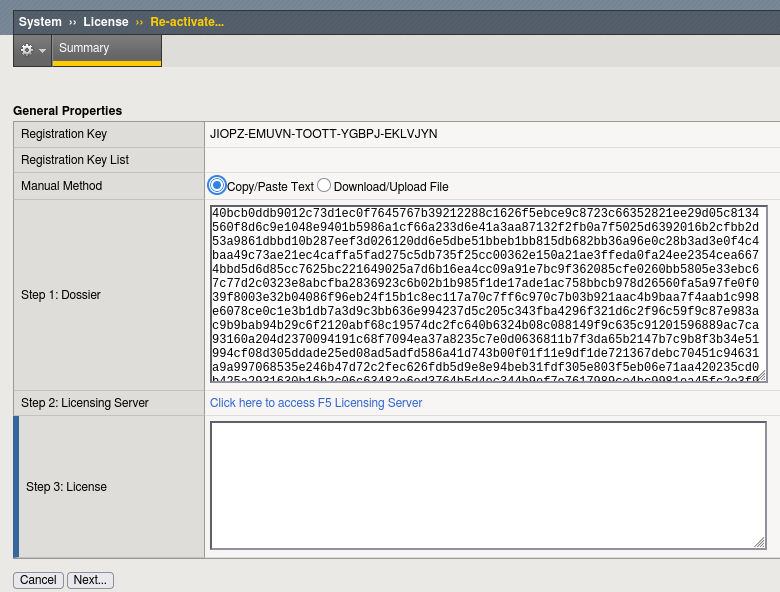
As an alternative to working with files, the same process can be performed by copy-pasting the dossier text and the license text between the BIG-IP and the F5 activation portal. In the end, both the dossier and the license are simply long, encoded text strings that can be transferred either way.
Verify licensing
After completing the licensing process using the Base Registration Key and dossier, it’s important to know how to verify that the license is correctly installed.
If your BIG-IP reports errors related to licensing, you’ll need to check details such as:
-
Whether the license is properly applied
-
The expiration date of the license
-
Which modules are licensed
You can verify this information through:
-
The Configuration Utility (GUI)
-
The TMSH (Traffic Management Shell)
-
The CLI (bash)
Verify license using Configuration Utility (GUI)
You can verify license details directly in the web interface:
- Log in to the BIG-IP Configuration Utility.
- Navigate to: System → License.
- The page will display:
- Registration key
- Licensed version
- Activation status
- Start and end dates
- A list of the licensed modules and features
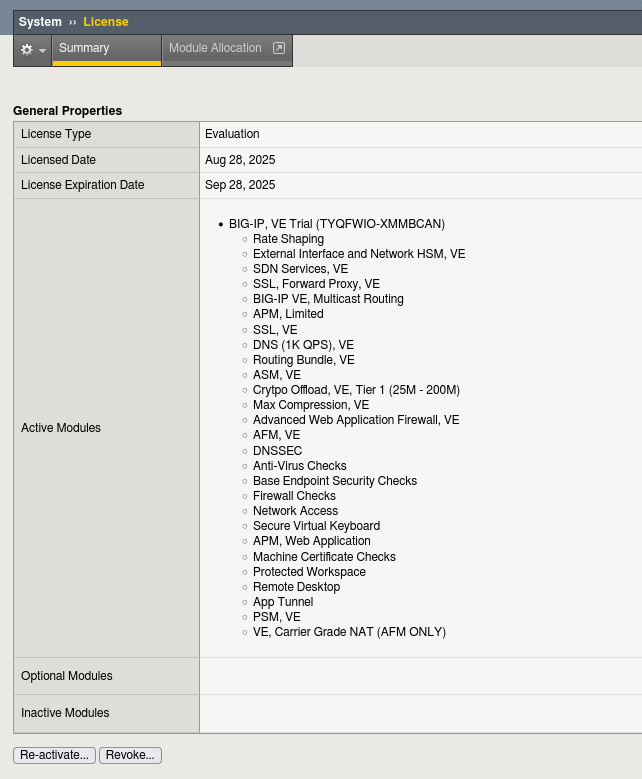
In this example, we can see that APM, Advanced Waf, AFM and DNS are licensed in the active module subsection.
Verify license using TMSH
You can check the current license status on your BIG-IP system using the tmsh command:
show /sys license
This command displays detailed license information.
It also lists the active modules available on the system. These modules appear under the keyword “Module” and indicate which features can be provisioned.
For example, in the output below, both the Global Traffic Manager (GTM) and Local Traffic Manager (LTM) modules are licensed :
Active Modules Global Traffic Manager Module (xxxxxxx-xxxxxxx) ADD IPV6 GATEWAY ADD RATE SHAPING ADD ROUTING BGP ADD ROUTING OSPF ADD ROUTING RIP Local Traffic Manager Module (xxxxxxx-xxxxxxx) ADD IPV6 GATEWAY ADD RATE SHAPING ADD 5 MBPS COMPRESSION ADD RAMCACHE ADD ROUTING BGP ADD ROUTING OSPF ADD ROUTING RIP
This makes it easy to confirm when the system was licensed, when it will expire, and which modules are available for provisioning.
Verify license using CLI (bash)
As with many BIG-IP configuration elements, the license is also stored locally as a file. You can inspect the license directly from the CLI by opening:
/config/bigip.licensew
This file contains the same details shown in tmsh, including registration information, license dates, and licensed modules. While less user-friendly, it can be useful for troubleshooting or automated checks where parsing raw license data is needed.
Conclusion
Licensing is a foundational step in bringing any F5 BIG-IP system into operation. From the Base Registration Key to the dossier and activation process, each element ensures that the system is uniquely identified and properly entitled to use its modules. Whether activated automatically through the Management IP or manually via an offline process, the license binds the system to its intended capabilities.
Regularly verifying license details, such as expiration dates and active modules, helps prevent unexpected service interruptions and ensures compliance.
Explore the other topics in the F5CAB1 exam blueprint ?